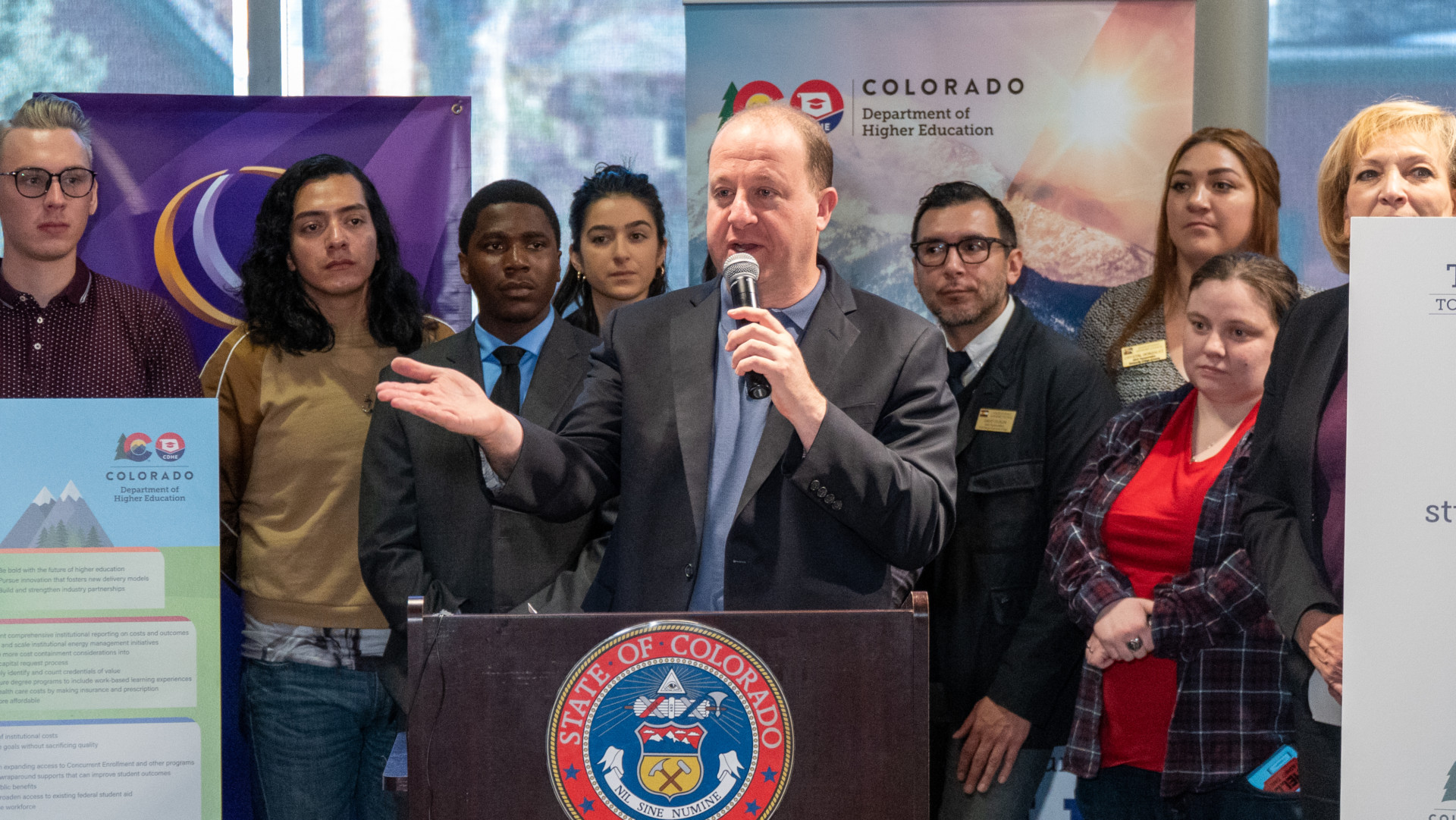
Colorado Gov. Jared Polis unveiled his plan, The Roadmap to Containing College Costs and Making College Affordable, on Nov. 12 at the Community College of Denver.
Universities and colleges across Colorado have been working for years to make high-quality higher education more affordable, and now a plan unveiled by Gov. Jared Polis builds on the goal of containing the cost of higher education to help make a degree or certificate a reality for more people.
The governor announced the plan, The Roadmap to Containing College Costs and Making College Affordable, Nov. 12 at the Community College of Denver, joined by students and several higher education leaders including the executive director of the Colorado Department of Higher Education, Angie Paccione; Colorado State University System Chancellor Tony Frank; CSU President Joyce McConnell, and President Tom Stritikus of Fort Lewis College. Frank and Stritikus were asked to speak on behalf of the state’s higher education institutions.
“We know that when Coloradans have more access to affordable educational opportunities, they thrive, and the benefits ripple across our state and help our economy,” said Gov. Jared Polis. “This roadmap lays out ways we can lower costs while maintaining high standards. We must work together to help bring down college and community college costs, encourage innovation, and support the next generation of students.”
The plan lays out short-, medium- and long-term action steps to contain costs and support students, address underlying structural issues, and increase innovation to improve outcomes for students. As part of the announcement, CSU System Chancellor Tony Frank said that every college and university in Colorado – research universities, state colleges, community colleges and technical colleges – is committed to affordable access to an education that helps students attain their goals.
He also noted that Colorado produces a college degree at a lower cost to taxpayers than any other state while remaining in the middle of the tuition marketplace. A shared commitment to equality of opportunity has raised enrollment of underserved populations while shrinking gaps in retention and graduation rates. But there’s more work to be done, Frank said.
“All of these issues that are in the roadmap are important to each of our institutions, and it’s important to remember that Colorado has this wonderfully diverse ecosystem of higher education institutions, ranging from some of the nation’s finest research universities, to the balanced set of regionally oriented institutions across our state,” said Frank. “That ecosystem helps Colorado: It helps drive the workforce of tomorrow; it helps drive the jobs of tomorrow; and it helps maintain Colorado’s economic quality of life.”
Details of the plan are available here.
The Colorado Department of Higher Education estimates that three out of four jobs in Colorado require a post-secondary credential, such as a certificate or a two- or four-year degree, while four of 10 of adults in Colorado haven’t completed education beyond high school.
“We aim to expand opportunity for all Coloradans,” said Paccione, explaining that considering innovative changes, such as offering more opportunities to get credit for military or other work experience, will be part of the work to continue building on the efforts of the state’s institutions to improve affordability and access to higher education.
“Over the last two decades, our institutions have really stepped up with innovative solutions to support our students. We look forward to working with higher ed leaders to maximize state investment going forward,” Paccione said.
For example, at CSU the commitment to affordability has led to multi-million dollar increases in financial aid, including a commitment that any Pell-eligible student can attend CSU without paying tuition or fees, and nearly half of CSU students graduate debt-free. At Fort Lewis College, students who run into unexpected financial hardships can apply for grants to help them pay those costs and stay focused on school.
“It is a shared commitment from both the state and the institutions to really drive cost containment and affordability,” Stritikus said in his remarks.
CSU President McConnell said the university stands ready to embrace new ideas that help higher education contain costs without sacrificing quality – efforts to which CSU has always been, and remains, committed.
“Ensuring access to an affordable, quality college education is paramount to our mission to serve Colorado students,” she said. “We look forward to collaborating on ways we can contain costs while delivering high-quality education to students, groundbreaking research that drives innovation to fuel our state economy, and essential services that benefit the citizens of Colorado.”
Initially, the roadmap focuses on transparency, accountability and efficiency to lower the cost of earning a certificate or degree, while the long-term vision is to boldly evolve higher education, create new ways of teaching and learning, and strengthen industry partnerships with institutions, all in collaboration with Colorado’s institutions of higher education.
“We know that when Coloradans have more access to affordable educational opportunities, they thrive, and the benefits ripple across our state and help our economy,” Gov. Polis said.